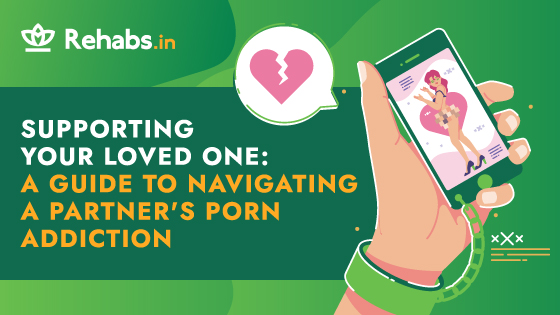Supporting Your Loved One: A Guide to Navigating a Partner’s Porn Addiction

Navigating a relationship when your partner is grappling with porn addiction can be incredibly challenging. It’s crucial to acknowledge the range of emotions you may be experiencing, from hurt and betrayal to confusion and frustration. Your partner’s struggle is undoubtedly difficult as well, battling with an addiction that often carries stigma and shame. It’s important to approach this situation with empathy and understanding, recognising that addiction is a complex issue that requires professional help and support.
Your understanding and empathy play a crucial role in helping your partner feel heard, validated, and encouraged to seek help. By offering non-judgmental support, you create a safe space for open communication and growth. Your willingness to educate yourself about addiction and its impact demonstrates your commitment to understanding their struggles and working towards solutions together. Effective support involves actively listening, showing empathy, and being patient throughout their recovery journey.
While you may feel a strong desire to help your partner through this journey, it’s equally vital to prioritise your own well-being. Setting boundaries, seeking therapy for yourself, and educating yourself about addiction can all be proactive steps toward supporting your partner while also taking care of yourself. It’s a delicate balance that requires patience, compassion, and a commitment to both your partner’s recovery and your own mental health. In this blog, we explore how to help someone with a porn addiction.
Understanding Porn Addiction
Porn addiction, also known as compulsive sexual behaviour disorder in the International Classification of Diseases (ICD 11) or problematic hypersexuality, refers to a pattern of behaviour where an individual has an intense and uncontrollable urge to consume pornography.
Behaviorally addicted individuals often display a problematic consumption pattern characterized by impaired control, such as experiencing cravings and unsuccessful attempts to reduce the behavior, impairment like a narrowing of interests and neglect of other life areas, and risky use, which involves persisting in the behavior despite awareness of its damaging psychological effects. Porn addiction can manifest in various ways, and the signs may vary from person to person. However, some common signs and symptoms of porn addiction include:
- Excessive Porn Consumption: Spending significant amounts of time watching pornographic material, often to the detriment of other responsibilities and activities.
- Loss of Control: Difficulty in controlling the urge to watch porn, leading to repeated attempts to cut down or stop without success.
- Preoccupation: Constantly thinking about or craving pornography, which can interfere with concentration and daily functioning.
- Increased Tolerance: Needing to watch more explicit or extreme forms of pornography to achieve the same level of arousal or satisfaction.
- Withdrawal Symptoms: Experiencing withdrawal symptoms such as irritability, restlessness, anxiety, or mood swings when unable to watch porn.
- Neglecting Responsibilities: Neglecting work, school, or social obligations due to excessive porn consumption.
- Continued Use Despite Consequences: Persistently watching porn despite negative consequences in relationships, mental health, or other areas of life.
- Escalation: Engaging in risky or illegal behaviours related to pornography, such as accessing illegal content or spending excessive amounts of money on pornographic material.
- Isolation: Withdrawing from social interactions or activities in favour of watching porn in solitude.
- Impact on Relationships: Experiencing difficulties in forming or maintaining intimate relationships due to the addiction’s effects on perceptions of sex, intimacy, and emotional connection.
In an Australian study involving over 20,000 participants, it was found that 1.2% of women and 4.4% of men identified themselves as addicted to online pornography. Porn addiction can have profound effects on both individuals and their relationships, impacting various aspects of life. Here are some common effects:
Effects on the individual:
- Mental Health: Porn addiction can contribute to feelings of shame, guilt, and low self-esteem. It may also lead to anxiety, depression, and other mental health issues.
- Distorted Perceptions: Excessive exposure to pornography can distort an individual’s perception of sex, intimacy, and relationships. It may lead to unrealistic expectations about sexual performance, body image, and arousal.
- Physical Health: Spending long hours watching porn can lead to physical health issues such as fatigue, sleep disturbances, and decreased physical activity.
- Productivity and Focus: Addiction to porn can interfere with productivity, focus, and concentration, affecting work or academic performance.
- Social Isolation: Excessive porn consumption may lead to social withdrawal, isolation, and difficulties in forming or maintaining relationships outside of online interactions.
Effects on the relationship:
- Trust Issues: Porn addiction can erode trust within a relationship, leading to feelings of betrayal and insecurity. Partners may struggle with doubts about fidelity and honesty.
- Communication Barriers: Addiction can create communication barriers, as individuals may avoid discussing their porn consumption due to shame or fear of judgment.
- Intimacy Issues: Porn addiction can impact emotional and physical intimacy in relationships. Individuals may prioritise porn over real-life interactions, leading to feelings of neglect or rejection from their partners.
- Conflict and Tension: Differences in attitudes towards porn or its effects can lead to conflict and tension within the relationship. Resentment, anger, and misunderstandings may arise.
- Sexual Dysfunction: In some cases, porn addiction can contribute to sexual dysfunction, such as erectile dysfunction or decreased libido, due to desensitisation and unrealistic expectations.
Empathy and understanding are essential in addressing porn addiction within your relationship. By approaching the situation with empathy, you create a safe and non-judgmental space for open communication and support. Understanding the underlying factors contributing to addiction, such as emotional pain, stress, or past traumas, allows for a more compassionate and effective approach to recovery.
Creating a Safe and Supportive Environment
Neuroscientific research indicates that Internet pornography addiction aligns with the addiction framework and shares fundamental mechanisms with substance addiction. Starting an open and supportive conversation about addiction with your partner requires sensitivity, empathy, and a non-judgmental approach. Here are some tips to help you navigate this conversation effectively:
- Choose the Right Time and Place: Find a quiet and private setting where both of you can talk without distractions or interruptions. Choose a time when your partner is relatively calm and receptive to discussions.
- Use “I” Statements: Begin the conversation by using “I” statements to express your feelings and concerns without assigning blame or judgment. For example, say, “I’ve noticed that you’ve been spending a lot of time watching porn, and I’m concerned about how it’s affecting you and our relationship.”
- Express Empathy and Understanding: Show empathy by acknowledging the challenges your partner may be facing due to their addiction. Let them know that you understand addiction is a complex issue and that you’re there to support them without judgment.
- Avoid Accusations: Avoid using accusatory language or making ultimatums that can make your partner feel defensive or ashamed. Focus on expressing your feelings and observations rather than placing blame.
- Offer Support and Reassurance: Let your partner know that you’re there to support them through their journey towards recovery. Offer reassurance that you love them unconditionally and that seeking help is a positive step towards healing.
- Listen Actively: Practice active listening by giving your partner your full attention and validating their feelings. Avoid interrupting or dismissing their experiences, and ask open-ended questions to encourage them to share more.
- Educate Yourself: Take the time to educate yourself about addiction, its effects, and available resources for support. This shows your commitment to understanding and helping your partner through this process.
- Explore Treatment Options Together: Suggest exploring treatment options together, such as therapy, support groups, or counselling. Offer to accompany your partner to appointments or research reputable resources together.
- Set Realistic Expectations: Understand that recovery from addiction is a journey that takes time, effort, and patience. Set realistic expectations and avoid pressuring your partner to change overnight.
- Reaffirm Your Love and Commitment: End the conversation by reaffirming your love, commitment, and willingness to work together to overcome challenges. Emphasise that you’re in this together as a team.
By approaching the conversation with empathy, understanding, and unconditional support, you create a safe and nurturing environment for your partner to open up and seek help. Remember that addiction recovery is a process, and your ongoing support and encouragement are invaluable to your partner’s journey towards healing.
Educating Yourself about Porn Addiction
It is important for you to educate yourself about porn addiction because it equips you with the knowledge and understanding needed to navigate this challenging situation effectively. By educating yourself, you gain insight into the complexities of addiction, including its psychological, emotional, and relational impacts. This knowledge allows you to approach the issue with empathy and compassion rather than judgment or blame, creating a supportive environment for your partner.
Learning about addiction can help you understand how to know if your partner’s addicted to porn. It also helps you recognise when intervention or support is needed, leading to early detection and treatment. Educating yourself also empowers you to communicate openly and effectively about addiction, set healthy boundaries, and seek appropriate resources for both your partner’s recovery and your own well-being. Overall, education about porn addiction plays a crucial role in promoting understanding, empathy, and constructive support within your relationship.
Encouraging Professional Help
Encouraging your partner to seek psychotherapy for porn addiction involves a supportive and understanding approach. Begin by expressing your concerns about their well-being and the impact of addiction on your relationship, emphasising your care and support. Educate them about addiction and treatment options, highlighting that seeking help is a positive step towards recovery. Normalise therapy and offer reassurance that it’s a common and effective way to address addiction challenges.
Be non-judgmental, empathetic, and understanding throughout the conversation, avoiding language that may make them feel ashamed or defensive. Offer to support them by accompanying them to therapy sessions or assisting in finding a suitable therapist. Set realistic expectations about the recovery process and celebrate any progress they make. Consider attending couple’s therapy together to address relationship dynamics affected by addiction. Ultimately, respect their autonomy and choices while providing encouragement and support throughout their recovery journey.
Setting Boundaries
Establishing boundaries around pornography use with your partner who has an addiction involves clear communication and open discussion about needs and expectations. Reflect on your own feelings and identify specific behaviours related to porn consumption that are challenging for you. Have an honest conversation with your partner, expressing your concerns and setting clear boundaries around the amount, type, and impact of their porn use on the relationship.
Be specific about what is acceptable and what is not, and communicate the consequences of crossing these boundaries. Consistently enforce these boundaries and prioritise self-care to maintain your well-being. Seek support from a therapist if needed to navigate this process effectively and promote mutual respect and understanding in your relationship.
Supporting Healthy Coping Mechanisms
Supporting your partner’s recovery from porn addiction involves encouraging and facilitating effective coping mechanisms. Encourage engagement in alternative activities and hobbies that bring fulfilment, such as painting or sports, while also promoting mindfulness practices like meditation and yoga to manage cravings and reduce stress.
Encourage regular exercise and healthy lifestyle habits, and seek professional help through therapy or support groups. Facilitate the establishment of a supportive network and the practice of self-compassion, celebrating small victories and setting realistic goals. By actively supporting these coping mechanisms, you can empower your partner in their journey towards recovery and overall well-being.
Addressing Relationship Dynamics
Sharing your concerns about trust issues stemming from your partner’s porn addiction is a crucial step in rebuilding the strength of your relationship. Start by choosing a calm and private setting where both of you can have an open and honest conversation without distractions.
Express your feelings and concerns using “I” statements to avoid sounding accusatory or judgmental. For example, you can say, “I feel hurt and worried about the trust issues that have arisen due to your porn addiction, and I believe it’s important for us to address these together.” Be specific about how the addiction has affected the relationship, such as instances of secrecy, communication barriers, or emotional distance.
After sharing your concerns, invite your partner to share their perspective and feelings without interruption. Listen actively and empathetically, acknowledging their experiences and emotions. Together, explore ways to rebuild trust and strengthen the relationship. This may involve setting clear boundaries around porn use, enhancing communication and transparency, attending couples counselling or therapy, and committing to mutual support and understanding. Emphasise the importance of working together as a team to overcome challenges and foster a healthier, more resilient relationship built on trust, honesty, and mutual respect.
Practicing Self-Care
Taking care of your own mental health is crucial while supporting a partner through addiction challenges. Firstly, prioritise self-care practices that promote emotional well-being, such as maintaining a balanced routine, getting adequate rest, engaging in regular exercise, and nourishing your body with nutritious food. Incorporate stress-reducing activities like mindfulness meditation, journaling, or hobbies that bring you joy and relaxation.
Seek support from trusted friends, family members, or a therapist who can provide a listening ear, guidance, and coping strategies to manage your own emotions and stress levels effectively. Secondly, set healthy boundaries to protect your mental health and well-being. Clearly communicate your needs and limits to your partner, including the need for time alone, space to process emotions, and respect for your own feelings and boundaries.
Practice self-compassion and avoid taking on unnecessary guilt or responsibility for your partner’s addiction. Remember that it’s okay to seek support for yourself and prioritise your own mental health during this challenging time. By taking proactive steps to care for yourself, you can maintain resilience, balance, and a sense of empowerment while supporting your partner through their recovery journey.
Celebrating Progress and Milestones
Celebrating progress and expressing pride and encouragement for your partner’s efforts in overcoming porn addiction is vital for their motivation and self-esteem. Start by acknowledging and praising specific milestones or achievements related to their recovery journey. For example, you can commend them for attending therapy sessions regularly, practising healthier coping mechanisms, or being open and honest about their struggles.
Express your pride and admiration for their courage, resilience, and commitment to change. Use positive and affirming language to convey your support and encouragement. Let them know how much you appreciate their efforts and the positive impact it has on the relationship and your lives together.
Celebrate progress in meaningful ways, such as planning a special date or activity to commemorate milestones, writing a heartfelt letter or note expressing your pride and encouragement, or simply verbally expressing your admiration and belief in their ability to overcome challenges. Your words and actions of celebration and encouragement can boost their confidence, motivation, and sense of accomplishment, strengthening your bond and fostering continued progress in their recovery journey.
Sources:
De Alarcón, R., De La Iglesia, J. I., Casado, N. M., & Montejo, Á. L. (2019b). Online Porn Addiction: What We Know and What We Don’t—A Systematic review. Journal of Clinical Medicine, 8(1), 91. https://doi.org/10.3390/jcm8010091
Love, T., Laier, C., Brand, M., Hatch, L., & Hajela, R. (2015). Neuroscience of Internet Pornography Addiction: A Review and update. Behavioral Sciences, 5(3), 388–433. https://doi.org/10.3390/bs5030388
ICD-11 for Mortality and Morbidity Statistics. (n.d.-c). https://icd.who.int/browse/2024-01/mms/en#1630268048
Rissel, C., Richters, J., De Visser, R. O., McKee, A., Yeung, A., & Caruana, T. (2017). A profile of pornography users in Australia: Findings from the second Australian study of health and relationships. The Journal of Sex Research https://doi.org/10.1080/00224499.2016.1191597

















